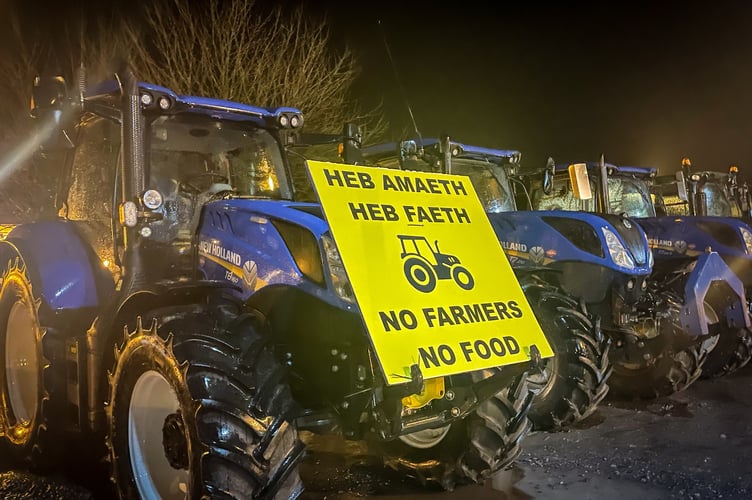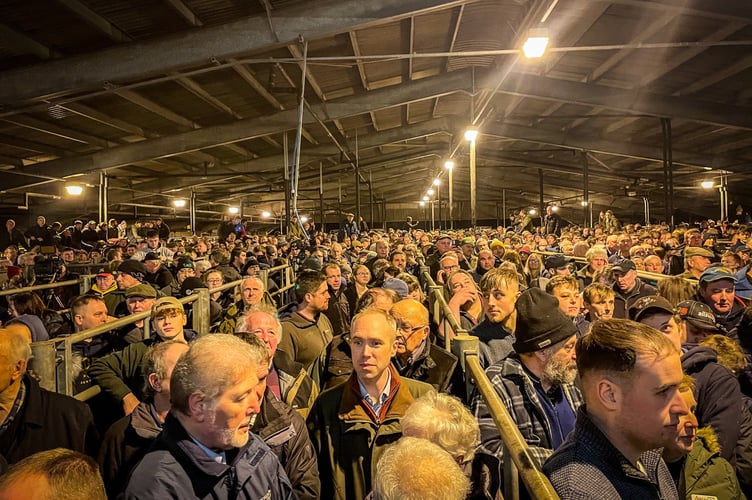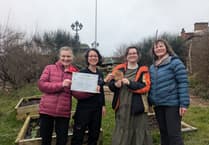Mari Davies and Ceredig Lewis along with their young family Enfys, three, and Tomos, one, are tenants on a farm-holding near Rhos y Gell, Devil’s Bridge.
As a young family starting their farming journey, they have established a flock of 550 Welsh ewes, Welsh mountain speckled face ewes and 120 ewe lambs as replacements together with a 20 head of beef cattle on 350 acres of upland terrain in north Ceredigion.
Coming to the end of their five-year tenancy, they are now unsure what their next steps will be.
The Welsh Government’s Sustainable Farming Scheme (SFS) initially published in 2018, has seen proposals improved significantly since its initial draft, but there remain a number of serious concerns still to be addressed.
This is the third and final consultation before the scheme is launched in 2025.
Responding to the SFS proposals due to close for farmers input by 7 March, Mari said: “We already feel that we are in a vulnerable position. As a young couple with small children farming without the security of a long-term owned holding – the uncertainty surrounding these SFS proposals have made us feel even more concerned.”
The SFS is the Welsh Government vision for farming after the upheavals caused by Brexit. In theory, it places a lot more emphasis on the environment. In reality — farmers in Wales are bitterly opposed to the government’s demand that 10 per cent of every farm must be set aside and planted with trees.
In addition, another 10 per cent of their land as wildlife habitat.
And, farmers ask, what other sector of the Welsh economy is being asked to take a very significant hit to their ability to make ends meet, losing 20 per cent of their production capabilities in a single fell swoop.
For many, keeping a farm productive under this new proposed regimen simply isn’t possible.
Given that 80 per cent of Wales is deemed agricultural, the SFS proposals are meeting stiff and widespread opposition.
And the timing of the SFS proposals couldn’t be worse, farmers say, adding to other economic and agricultural issues that area creating a perfect storm for the sector.
Before the SFS is introduced from 2025, farmers want a settlement to the current environmental payments scheme now.
The Habitat Wales Scheme (HWS) is meant to reward farmers for helping wildlife but is almost half as little as the previous scheme. The HWS — also referred to as ‘basic payments scheme are 45 per cent less than those under the Glastir scheme.

Farmers also face a slew of new regulations over slurry and pollution controls.
Previously, about four per cent of Welsh land was designated as Nitrate Vulnerable Zones (NVZ) — areas with tough regulations rules on the storage and spreading of man-made fertilizer and manure in order to protect water quality from runoff into rivers. Since 2021, however, the Welsh Government expanded the NVZ rules to cover all of Wales. In effect, the new rules limit the number of animals farmers can keep, more will have to be spent on slurry storage, and fertilizers can only be used at certain times of the year.
Again, those measures are hitting farmers in the pocket.
Other rules to tackle and eradicate tuberculosis in cattle are also costing cattle farmers more.
And like everyone, farmers are feeling the pinch of higher costs for energy, fertilizers, feedstuffs, fuel, building materials and everything associated with running a farm and operating as a small business in a weather and season-sensitive environment.
Add all of those factors together, and farmers are furious.
For their part, Cardiff Bay says the SFS and other plans will secure safe food production, keep farmers farming, protect the environment and combat the climate crisis and encourage nature’s future.
Mari isn’t buying the Welsh Government’s position for a minute.
“If we, as younger farmers, can’t see a future within the SFS, what hope is there for the industry and for the next generation of farmers to continue producing food here in Wales?
“Things are challenging at the moment. We’re at the stage in the business where the bank is expecting our five year financial plan. But we’re not in a position to offer these figures, until we know what the SFS requirements will be, so we can even begin to fathom the next five years. The SFS in its current form would see us having to make so many substantial changes to our farming practices, it would not be financially viable. And we all know, you can’t run a business on a loss.”
Modelling on the potential Wales-wide economic effects of the SFS published alongside the consultation suggests:
• a reduction in farm business income of up to £199 million;
• a reduction in farm output of £125 million;
• 122,000 fewer livestock units;
• and an 11 per decline in on-farm labour requirements.
NFU Cymru said this would be the equivalent of losing 5,500 jobs.
Ian Rickman, FUW president said: “The reality is that if the scheme remains in its current form, and if the modelling report is correct, farmers uptake will be minimal, everyone will lose out – Welsh farmers, the environment, the public and ultimately the Welsh Government.”
Mr Rickman has written to all members urging individuals and businesses to formally respond to the Welsh Government’s (SFS) consultation and to make their voices heard.
“We need only look at the statistics from the Farm Business Survey to understand the significance of agricultural and rural development funding to our food supply chains and the wider rural economy.
“This is the third and final consultation on the SFS proposals and the importance of getting it right cannot be underestimated.
“We have already spoken directly with over 1500 farmers at our local county meetings across Wales in recent weeks, and our team of farming experts have been pushing for changes and amendments to the Welsh Government’s plans over a number of years. This is a crucial juncture for Welsh agriculture and its future
“There is a real worry that even under a scenario where scheme payments come nowhere near to compensating for the loss of the Basic Payment Scheme, there will be some farm businesses that will have no choice other than to participate in the SFS. This will, no doubt, place further pressure on farmers’ workload and mental health,” he said.
The FUW president continued: “The Sustainable Farming Scheme must be accessible by all and provide long-term stability for farming businesses and the wider rural economy that relies upon agriculture. It needs to provide a meaningful income stream which properly rewards farmers and underpins the importance of a high-quality food supply chain, produced here in Wales.”
The FUW president said the uncertainty around the future of agricultural support in Wales comes against a backdrop of continuous bovine TB breakdowns and the slaughtering of thousands of Welsh cattle every year.
“This is in addition to an all-Wales approach to bureaucratic pollution regulations which will cost the industry in excess of £400 million to comply with,” he said.
“The recent meetings at Welshpool and Carmarthen livestock markets made a clear statement about the frustration felt by many farmers. It illustrated the groundswell of concern with regards to the current situation and future direction of agricultural policy here in Wales.

Around 3,000 farmers gathered in Carmarthen recently and heard Cefin Campbell, Plaid Cymru MS for Mid and West Wales, say: “Enough is enough.
“The frustration our farmers and rural communities feel towards the Welsh Government and Westminster on many issues was all too clear.
“I will do my best to make sure their voice is heard in Cardiff Bay, and I would urge the Welsh Government to accept the unanimous call made by those present for a meeting, where these concerns can be discussed further”.
The protest in Carmarthen Showground saw a mock coffin brought into the venue, with a plaque reading ‘in memory of Welsh farming’ and other placards stating ‘no farmers, no food’.
Speaking to the crowd, Ceredigion farmer Wyn Evans told those present: “Believe in yourselves, you are making a difference.
“You might not think so, but you are. Since the meeting in Welshpool last week, the opposition parties have engaged.”
His speech was met with rapturous applause.
NFU Cymru members in Ceredigion are invited to a county meeting at the Llanina Arms in Llanarth at 7.30pm on Wednesday, 28 February.
Responding to farming industry leaders warning of “huge unrest” over planned Welsh Government reforms, Samuel Kurtz MS, shadow rural affairs minister, said: “Had the Welsh Government taken seriously my calls to pause the SFS consultation, then changes to the proposal could have been made. Sadly, my calls, like the calls from the farmers themselves were ignored.
“The inevitably of farmers protesting is linked to the Welsh Government’s inability to listen.
“I will stand shoulder to shoulder with farmers during any protest. My message to them is only stick together, be respectful, but the Welsh Conservatives will be with you.”
Mr Rickman said: “As a farmer myself I fully understand and comprehend the frustrations of many at these meetings. We need to ensure that we work together and that the voice of Welsh farmers is being heard by decision makers in Wales and Westminster. Both farming unions will be meeting with minister for rural affairs Lesley Griffiths to discuss the way forward.
“I cannot, however, overstate how important it is for every individual and business that will be affected by these proposals to formally respond to this consultation by 7 March. It is absolutely crucial that we all do so.
“I would also ask you to contact your local elected representatives at every opportunity, whether they are county councillors, local and/or regional Members of the Senedd or Members of Parliament at Westminster.”
On Sunday, around 100 tractors took part in a protest during Vaughan Gething and Jeremy Miles’ Welsh Labour leadership hustings, in Newtown.
Earlier in the week, farmers protested in Wrexham and one man was arrested as vehicles along with 20 pick-ups drove to the constituency office of Ms Griffiths.
On Monday, First Minister Mark Drakeford defended his government’s plans to ask farmers to plant trees on their land in return for cash.
The Welsh Labour leader said farmers could not simply decide themselves what to do with millions in subsidies, and said the plans would see farmers paid to help address the climate crisis.
He said he understood it was a “difficult time” for rural Wales, but added: “Change is unavoidable.”
Mr Drakeford said that legitimate protest was “absolutely a right” but he said criminal damage was “not acceptable” and warned protesters from having a major impact on other people’s lives.
Responding to Mr Drakeford’s comments, Andrew RT Davies MS, leader of the Welsh Conservatives, said: “This statement shows the First Minister’s naked contempt for our farmers.
“Labour and Plaid Cymru fail to realise that no farmers means no food, as they sacrifice our agricultural communities at the altar of a fanatical green agenda.
“The Sustainable Farming Scheme has been rejected by the farming community and it is high time Labour and Plaid scrap this policy before it does irreversible damage to our rural communities.”
At the end of day, all farmers want to do is farm.
Mari and Ceredig are eager that their children, Enfys and Tomos, are given the choice to live and work the land at their Ceredigion farm.
“All that we do and sacrifice is for the children’s future. That’s the reason we both also work off the farm to give us all the best opportunity to thrive here,” added Ceredig.




